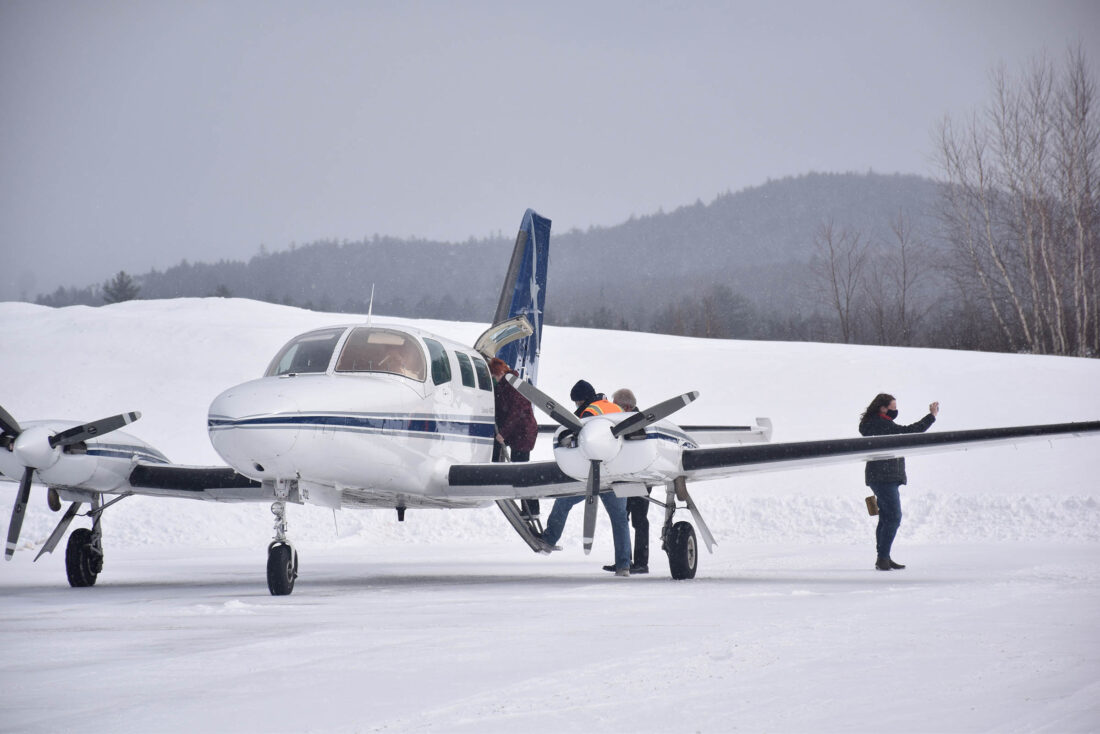Found funds
Federal subsidies for SLK flights extended again to Nov. 18 as shutdown hits one-month mark

A Cape Air flight takes off from Adirondack Regional Airport in March 2022. (Enterprise photo — Aaron Marbone)
LAKE CLEAR — The federal subsidies for Cape Air flights in and out of Adirondack Regional Airport have been extended yet again, until at least Nov. 18, if the now-31-day government shutdown continues.
The Harrietstown-owned SLK airport is part of the Essential Air Service network — a U.S. Department of Transportation program that subsidizes flights for around 170 rural airports in the U.S. This allows airports like SLK, which would not be able to have a profitable commercial air service, to still offer flights.
Because of the shutdown, the DOT does not have access to the money Congress set aside for the EAS program.
Initially, the program would have run out of money on Oct. 12. But in the first week of the month, the DOT announced it had secured additional funding to run it through Sunday.
The DOT announced on Wednesday night that it had “secured additional funding” to continue subsidizing these flights for an additional two weeks.
The DOT did not specify where the new money came from.
“While the lapse in Congressionally appropriated funding continues, the Department has been able to secure additional budgetary resources to maintain program operations longer than expected,” DOT Principal Deputy Assistant Secretary Daniel Edwards said in a notice.
After congressionally appropriated money ran out, the department swapped to its other source of revenue for the program — overflight fees collected by the Federal Aviation Administration. These fees come in with inconsistent numbers each month.
Without this additional funding, the program funding would have run out on Nov. 2. The subsidy would have ended on Nov. 3 and EAS carriers like Cape Air would have been relieved of their obligations to provide flight service.
When the initial funding stop was announced, SLK Airport Manager Corey Hurwitch said Cape Air was planning to continue its flights even without the subsidy, operating at a loss — at least in the short-term — banking on the potential that those subsidies would be paid retroactively after the shutdown ends.
If Cape Air had done this, there was a potential the subsidies for the flights during the extended shutdown would be paid back, but the DOT told air carriers they were continuing to offer flights “at their own risk.”
Even if the flights had been subsidized retroactively, Hurwitch said airlines cannot run unsubsidized flights indefinitely. If the shutdown continued too long, he said Cape Air may have needed to change its decision.
Hurwitch said he’s not sure if this promise from Cape Air would still stand if the subsidy does run out, but he’s hoping he doesn’t need to find out.
“The Department will continue to closely monitor the availability of budgetary resources as Nov. 18 approaches and will provide further updates as needed if the lapse in appropriations continues,” Edwards said in the notice.
The DOT contracts with Cape Air for 21 round-trip flights a week — 14 to Boston and seven to JFK in New York City — with an annual subsidy of $2,794,783. This accounts for an average subsidy of $2,559 per flight.
According to data from the DOT, Cape Air has had 9,080 passengers so far in 2025 — an average of 14.5 enplanements per day.
–
TSA and ATC
–
Hurwitch said Transportation Security Administration and Air Traffic Control staff have both been working without pay for about a month now.
He said the seven full-time and two part-time TSA employees at SLK are still working and “maintaining a professional attitude” about working without pay. They’ve had flight delays at SLK for weather, crew rest or mechanical issues — but not for TSA shortages.
There is no ATC tower at SLK, but Hurwitch said some private planes use the “Boston Center” ATC facility in Nashua, New Hampshire. All planes use that center when they need to fly on instruments — when visible flight is not possible due to weather.
Currently, the Boston Center facility is facing staffing shortages, according to the FAA.
Transportation Secretary Sean Duffy estimated that ATC staffing levels have dropped 50% in some places.
–
Airline contract
–
The government shutdown may also hold up the DOT’s decision on which airline to contract with for EAS flights out of SLK. This time, in addition to Cape Air reapplying to earn the contract, three other airlines threw in applications, too.
The time period for the public to recommend airlines has ended. The town council has also made its recommendation to the DOT — opting in a split 3-2 vote to request the larger jet airline SkyWest with a line to Detroit, instead of sticking with Cape Air.
Ultimately, the DOT makes the decision on which airline gets the contract.
To read more about the vote, go to tinyurl.com/42hckwv4.
–
The shutdown
–
The current shutdown started on Oct. 1, is the first in six years and has no clear end in sight.
Republicans and Democrats have competing funding bills and neither have been able to garner the 60 votes needed in the Senate. The Senate has voted 13 times and has not been able to reach a deal.
The Senate adjourned Thursday and will not meet until Monday, setting this shutdown up to potentially match the longest shutdown in U.S. history — 35 days from December 2018 to January 2019.
Republicans want to pass a “continuing resolution” which would fund the government through Nov. 21.
Democrats are voting against the resolution because Affordable Care Act tax credits, which subsidize health insurance, expire at the end of the year. They want a permanent extension to the subsidies.
Republicans have a majority in the Senate — 53. Democrats have 45 senators and there are two independents who caucus with the Democrats.
The continuing resolution has gotten at most 55 votes of approval.
Sen. Rand Paul, R-Kentucky, is the only Republican to vote against it. Democrat senators John Fetterman, Pennsylvania, and Catherine Cortez Masto, Nevada, as well as Maine independent Sen. Angus King, have voted with Republicans.
Democrats are using the Senate’s loose filibuster rules to stop the Republican legislation from passing. Instead of the usual 50-vote simple majority it takes to pass something in the Senate, when just one senator invokes a filibuster, it takes a 60-vote supermajority to end it.
Republicans want to split the tax credit discussion from the funding resolution and work on them separately. Democrats say, with open enrollment for insurance starting in less than a month, action needs to be taken now — not just before the end of the year.
During the coronavirus pandemic, Congress expanded the eligibility for these tax credits to include people earning up to more than four times the federal poverty level. Four times the federal poverty level is $62,600 for a single-person household and $106,600 for a family of three.
If these subsidies are not renewed by the end of the year, the people receiving them could see their monthly or annual insurance premium payments rise severely.
Insurance commissioners across the country feel Congress was overlooking the deadline up until just recently.



